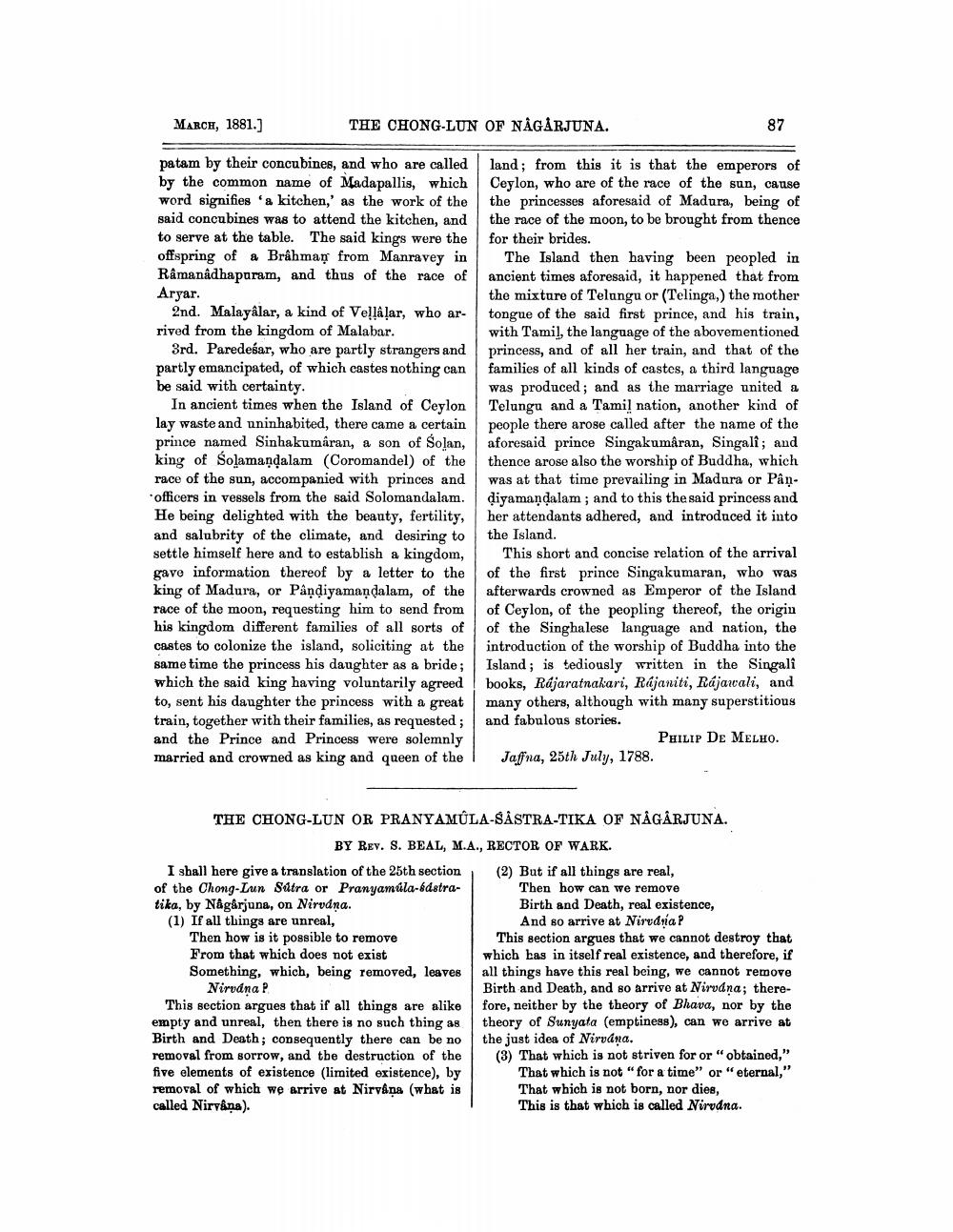________________
THE CHONG-LUN OF NAGARJUNA.
MARCH, 1881.]
patam by their concubines, and who are called by the common name of Madapallis, which word signifies a kitchen,' as the work of the said concubines was to attend the kitchen, and to serve at the table. The said kings were the offspring of a Brahman from Manravey in Râmanâdhapuram, and thus of the race of Aryar.
2nd. Malayâlar, a kind of Vellalar, who arrived from the kingdom of Malabar.
3rd. Paredeśar, who are partly strangers and partly emancipated, of which castes nothing can be said with certainty.
In ancient times when the Island of Ceylon lay waste and uninhabited, there came a certain prince named Sinhakumaran, a son of Solan, king of Solamandalam (Coromandel) of the race of the sun, accompanied with princes and officers in vessels from the said Solomandalam. He being delighted with the beauty, fertility, and salubrity of the climate, and desiring to settle himself here and to establish a kingdom, gave information thereof by a letter to the king of Madura, or Pândiyamandalam, of the race of the moon, requesting him to send from his kingdom different families of all sorts of castes to colonize the island, soliciting at the same time the princess his daughter as a bride; which the said king having voluntarily agreed to, sent his daughter the princess with a great train, together with their families, as requested; and the Prince and Princess were solemnly married and crowned as king and queen of the
I shall here give a translation of the 25th section of the Chong-Lun Sátra or Pranyamúla-éástratika, by Nagarjuna, on Nirvana.
(1) If all things are unreal,
Then how is it possible to remove From that which does not exist
Something, which, being removed, leaves Nirvana P
THE CHONG-LUN OR PRANYAMULA-SASTRA-TIKA OF NAGARJUNA.
BY REV. S. BEAL, M.A., RECTOR OF WARK.
This section argues that if all things are alike empty and unreal, then there is no such thing as Birth and Death; consequently there can be no removal from sorrow, and the destruction of the five elements of existence (limited existence), by removal of which we arrive at Nirvana (what is called Nirvana).
87
land; from this it is that the emperors of Ceylon, who are of the race of the sun, cause the princesses aforesaid of Madura, being of the race of the moon, to be brought from thence for their brides.
The Island then having been peopled in ancient times aforesaid, it happened that from the mixture of Telungu or (Telinga,) the mother tongue of the said first prince, and his train, with Tamil, the language of the abovementioned princess, and of all her train, and that of the families of all kinds of castes, a third language was produced; and as the marriage united a Telungu and a Tamil nation, another kind of people there arose called after the name of the aforesaid prince Singakumaran, Singalî; and thence arose also the worship of Buddha, which was at that time prevailing in Madura or Pândiyamandalam; and to this the said princess and her attendants adhered, and introduced it into the Island.
This short and concise relation of the arrival of the first prince Singakumaran, who was afterwards crowned as Emperor of the Island of Ceylon, of the peopling thereof, the origin of the Singhalese language and nation, the introduction of the worship of Buddha into the Island; is tediously written in the Singali books, Rajaratnakari, Rájaniti, Rajawali, and many others, although with many superstitious and fabulous stories.
PHILIP DE MELHO.
Jaffna, 25th July, 1788.
(2) But if all things are real,
Then how can we remove
Birth and Death, real existence,
And so arrive at Nirvana?
This section argues that we cannot destroy that which has in itself real existence, and therefore, if all things have this real being, we cannot remove Birth and Death, and so arrive at Nirvana; therefore, neither by the theory of Bhava, nor by the theory of Sunyata (emptiness), can we arrive at the just idea of Nirvana.
(3) That which is not striven for or "obtained," That which is not "for a time" or "eternal," That which is not born, nor dies, This is that which is called Nirvana.




